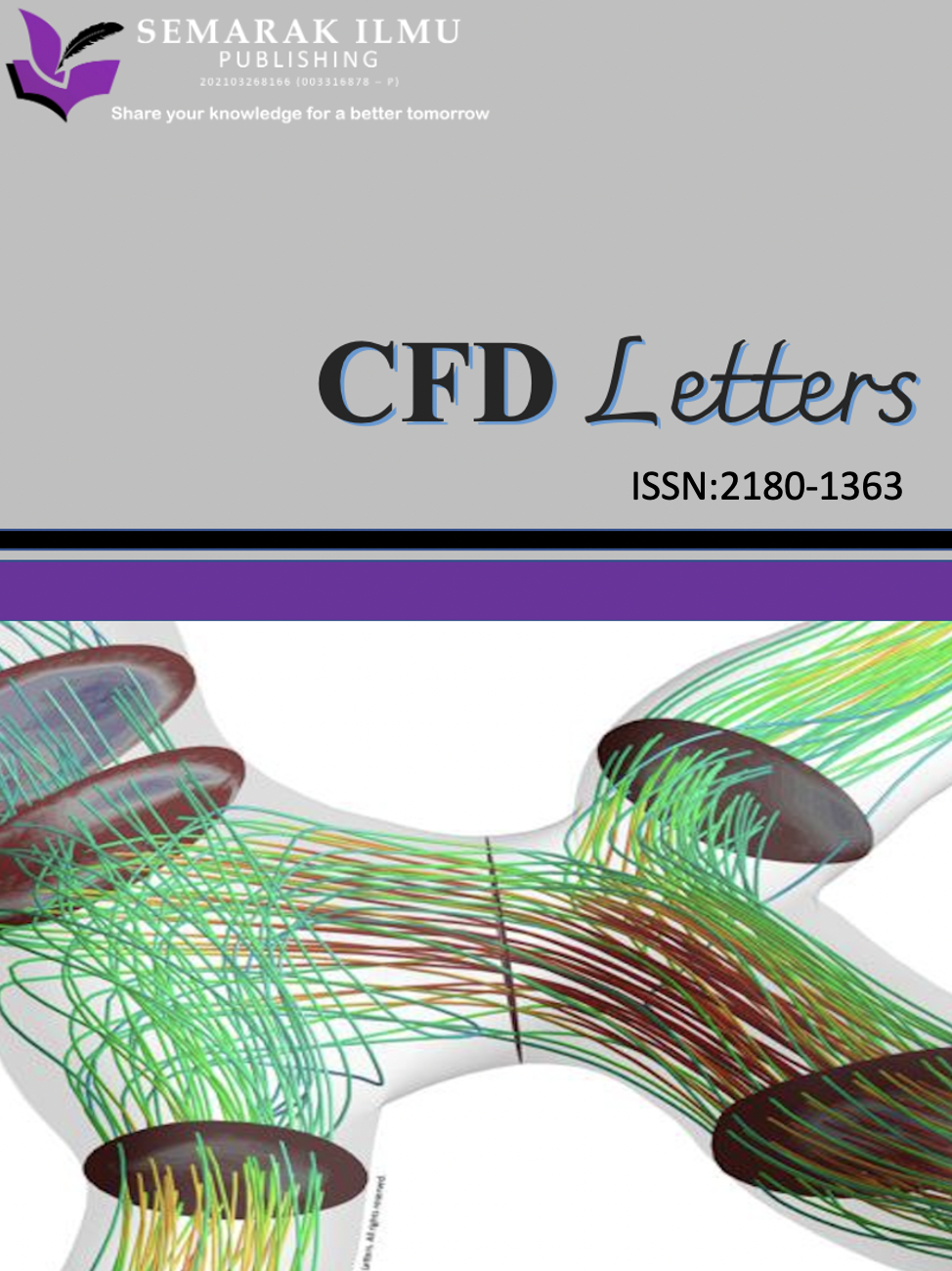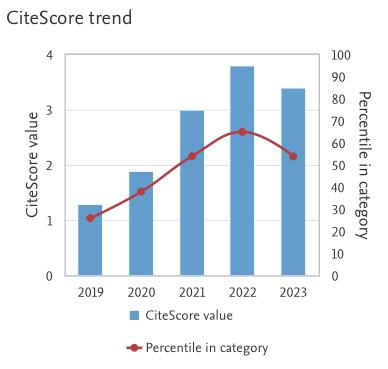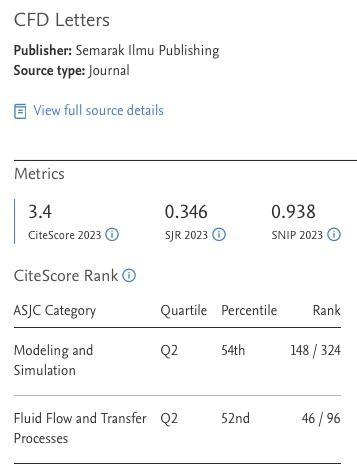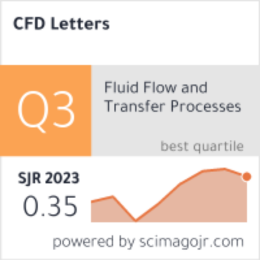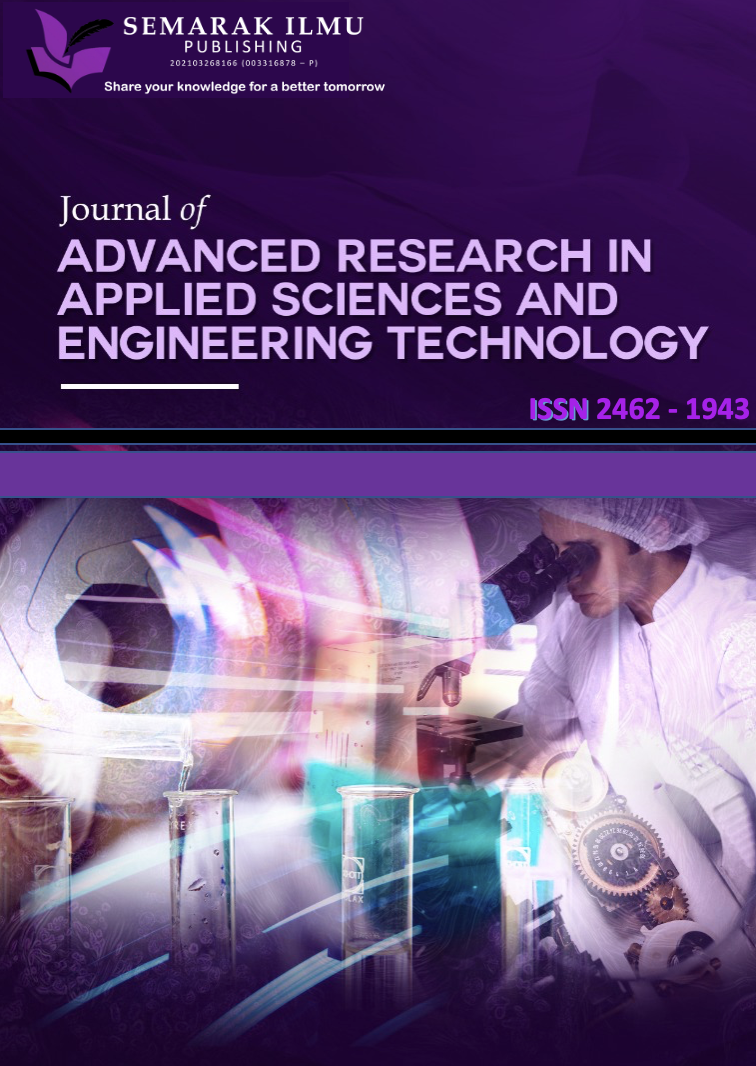Effects of Mesh Number and the Time-step-based Parameter on the Accuracy of Couette Solution
DOI:
https://doi.org/10.37934/cfdl.17.1.3545Keywords:
Couette solution, Crank-Nicolson method, the time-step-based parameter, convection-diffusionAbstract
Couette flow, a flow between two parallel plates with one plate in motion and the other stationary, has been extensively studied and applied in vaCouette flow, a flow between two parallel plates with one plate in motion and the other stationary, has been extensively studied and applied in various engineering and scientific fields. However, optimizing the accuracy of numerical solutions for such a flow is always a challenge. In this study, we focus on a quasi-1-dimensional Couette flow to investigate the impact of mesh number and the time-step-based parameter on the accuracy of the numerical solution. The Crank-Nicolson finite difference method is employed to solve the corresponding equation. The results suggest that the error linked to the unsteady Couette solution increases as the number of intervals rises. However, increasing the time-step-based parameter, has the potential to reduce the error, although it may lead to a simultaneous increase in the likelihood of oscillation. The findings can be leveraged in real applications to enhance the accuracy, efficiency, and reliability of computational simulations for improving the quality of the results, making informed decisions, and advancing the state of the art in respective fields.rious engineering and scientific fields. However, optimizing the accuracy of numerical solutions for such a flow is always a challenge. In this study, we focus on a quasi-1-dimensional Couette flow to investigate the impact of mesh number and the time-step-based parameter on the accuracy of the numerical solution. The Crank-Nicolson finite difference method is employed to solve the corresponding equation. The results suggest that the error linked to the unsteady Couette solution increases as the number of intervals rises. However, increasing the time-step-based parameter, has the potential to reduce the error, although it may lead to a simultaneous increase in the likelihood of oscillation. The findings can be leveraged in real applications to enhance the accuracy, efficiency, and reliability of computational simulations for improving the quality of the results, making informed decisions, and advancing the state of the art in respective fields.
Downloads
References
Rihan, Y. "Computational study of Couette flow between parallel plates for steady and unsteady cases." (2008).
SKF, “Plain Bearings.” https://www.skf.com/group/products/plain-bearings (accessed Jan. 26, 2023).
Jiménez, Javier, Genta Kawahara, Mark P. Simens, Masato Nagata, and Makoto Shiba. "Characterization of near-wall turbulence in terms of equilibrium and “bursting” solutions." Physics of Fluids 17, no. 1 (2005). https://doi.org/10.1063/1.1825451
Orlandi, Paolo, Matteo Bernardini, and Sergio Pirozzoli. "Poiseuille and Couette flows in the transitional and fully turbulent regime." Journal of Fluid Mechanics 770 (2015): 424-441. https://doi.org/10.1017/jfm.2015.138
Hu, Sean, and Xiaolin Zhong. "Linear stability of viscous supersonic plane Couette flow." Physics of Fluids 10, no. 3 (1998): 709-729. https://doi.org/10.1063/1.869596
Sukanek, Peter C., Charles A. Goldstein, and Robert L. Laurence. "The stability of plane Couette flow with viscous heating." Journal of Fluid Mechanics 57, no. 4 (1973): 651-670. https://doi.org/10.1017/S002211207300193X
Tuckerman, Laurette S., Matthew Chantry, and Dwight Barkley. "Patterns in wall-bounded shear flows." Annual Review of Fluid Mechanics 52 (2020): 343-367. https://doi.org/10.1146/annurev-fluid-010719-060221
Islam, S., Rehan Ali Shah, Ishtiaq Ali, and Nasro Min Allah. "Optimal homotopy asymptotic solutions of Couette and Poiseuille flows of a third grade fluid with heat transfer analysis." International Journal of Nonlinear Sciences and Numerical Simulation 11, no. 6 (2010): 389-400. https://doi.org/10.1515/IJNSNS.2010.11.6.389
Domaradzki, J. Andrzej, and Ralph W. Metcalfe. "Direct numerical simulations of the effects of shear on turbulent Rayleigh-Bénard convection." Journal of Fluid Mechanics 193 (1988): 499-531. https://doi.org/10.1017/S002211208800223X
Sukhtayev, Alim, Kevin Zumbrun, Soyeun Jung, and Raghavendra Venkatraman. "Diffusive stability of spatially periodic solutions of the Brusselator model." Communications in Mathematical Physics 358 (2018): 1-43. https://doi.org/10.1007/s00220-017-3056-x
Dawson, Clint N., Qiang Du, and Todd F. Dupont. "A finite difference domain decomposition algorithm for numerical solution of the heat equation." Mathematics of computation 57, no. 195 (1991): 63-71. https://doi.org/10.2307/2938663
Kuznik, Frédéric, and Joseph Virgone. "Experimental investigation of wallboard containing phase change material: Data for validation of numerical modeling." Energy and Buildings 41, no. 5 (2009): 561-570. https://doi.org/10.1016/j.enbuild.2008.11.022
Olshanskii, Maxim A., Arnold Reusken, and Xianmin Xu. "An Eulerian space-time finite element method for diffusion problems on evolving surfaces." SIAM journal on numerical analysis 52, no. 3 (2014): 1354-1377. https://doi.org/10.1137/130918149
Lord, Gabriel J., and Antoine Tambue. "A modified semi–implicit Euler–Maruyama scheme for finite element discretization of SPDEs with additive noise." Applied Mathematics and Computation 332 (2018): 105-122. https://doi.org/10.1016/j.amc.2018.03.014
Liu, Shean‐Lin. "Stable explicit difference approximations to parabolic partial differential equations." AIChE Journal 15, no. 3 (1969): 334-338. https://doi.org/10.1002/aic.690150308
He, Yinnian, and Weiwei Sun. "Stability and convergence of the Crank–Nicolson/Adams–Bashforth scheme for the time-dependent Navier–Stokes equations." SIAM Journal on Numerical Analysis 45, no. 2 (2007): 837-869. https://doi.org/10.1137/050639910
McCabe, Maurice, Peter K. Stansby, Benedict D. Rogers, and Lee S. Cunningham. "Boussinesq modelling of tsunami and storm wave impact." Proceedings of the Institution of Civil Engineers-Engineering and Computational Mechanics 167, no. 3 (2014): 106-116. https://doi.org/10.1680/eacm.13.00025
A. Sharhan and A. H. Al-Muslimawi. “Numerical Study of Shear and Extensional Inelastic Contraction Flows.” CFD Letters 15, no. 8 (2023): 107–121. https://doi.org/10.37934/cfdl.15.8.107121
H. Hanafi, H. Hanif, S. Shafie, F. Bosli, and M. R. Ilias. “Unsteady Free Convection Dusty MHD Flow with Dissipation Effect Over Non-Isothermal Vertical Cone.” Journal of Advanced Research in Fluid Mechanics and Thermal Sciences 114, no. 1 (2024): 56–68. https://doi.org/10.37934/arfmts.114.1.5668
Khan, Amin, Muhammad Ahsan, Ebenezer Bonyah, Rashid Jan, Muhammad Nisar, Abdel-Haleem Abdel-Aty, and Ibrahim S. Yahia. "Numerical solution of Schrödinger equation by Crank–Nicolson method." Mathematical Problems in Engineering 2022 (2022). https://doi.org/10.1155/2022/6991067
Jabbar, Ahmed. "The Finite Element Method for Nonlinear Huxely Equation." University of Thi-Qar Journal of Science 2, no. 2 (2010): 113-126.
Zhao, Jie, Zhichao Fang, Hong Li, and Yang Liu. "A Crank–Nicolson finite volume element method for time fractional Sobolev equations on triangular grids." Mathematics 8, no. 9 (2020): 1591. https://doi.org/10.3390/math8091591
John, D., and J. R. Anderson. "Computational fluid dynamics: the basics with applications." Mechanical engineering series (1995): 261-262.






